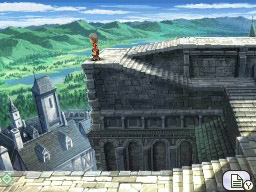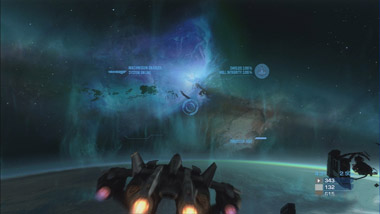Suikoden Tierkreis

In the first Suikoden, close to the end, you have defeated emperor Barbarossa’s army and enter the capital bent on finding him and putting an end to his rule. The capital is also the place in which the game starts, but when entering now the place has lost its color, the people are gone and the cheery music is but a distant echo. Upon walking up to the gates of the palace you find Barbarossa’s last general Ain Gide blocking the way – as he has earlier in the story proven to be a just man a short exchange takes place where your companions try to persuade him to realize the error of the emperor’s ways and step aside. Ain Gide agrees that there may be a point to your quest and admits that he may not be able to stop you, but holds his ground saying that his loyalty lies with his friend the emperor and it would be disgraceful for him to betray that trust – as such, you are forced to cut him down to continue.
This, for me, is an example of what is so great about the earlier Suikoden games – while they have varying degrees of fantastic elements with magic and prophecy in the narrative, at their core they are about politics between nations and how they affect relations between individuals. It is never about saving the world, just about persevering over the opposing force – a force whose goals are no more wrong than your own and whose heroes are fleshed-out characters with ideals. While the story sometimes gets ham-handed or silly the general idea is good, and no other games – or any other media for that matter – have moved me as much as the best parts of the Suikoden games.
Suikoden Tierkreis abandons the Suikoden legacy and is set in an entirely new world and except for a few bullet-points on the backs of the earlier games it also abandons most of the staples of the series. The character-specific weapons, magic system and 6-character parties of the earlier games is replaced with parties of 4 characters that are much more customizable. Random encounters are annoyingly frequent – to some extent the earlier games had this problem but it was alleviated by the now removed “let go” – command that allowed you to escape harmless enemies quickly. While I personally think most of these changes only serve to remove the unique and interesting parts of the Suikoden games, it is mostly a matter of preference… What is worse is how the narrative was changed.
Maybe the fact that the protagonist is no longer silent is what irks me most about the game. Suikoden III tried this as well and was slightly more successful, but in Tierkreis the main character is an annoyingly cheery brat who never gets to tackle any moral choice harder than “Save the world or let it be destroyed”. This is another problem – Tierkreis is not about overthrowing a nation taken over by corrupt leaders, it is about preventing an evil deity from destroying the world. The opposing force is a fanatical religious organization with poorly-defined ideas, and any characters in it are either altogether evil or deceived by the leaders.
It has been said that the Suikoden series didn’t sell well enough and a change of direction was called for. What really saddens me is that this – as was the case with Other M – seems to indicate making a game that removes what is unique and appealing about the series to make it more like the archetypal JRPG.
The Age of Exposition
I am a bit late to the party on this but it seems at least two anonymous developers have tried to make revelations of inside information in the games industry lately; one outing DotA developer IceFrog and another sharing strong words about the development of Warhammer Online. Things like these have a tendency to pop up in comments when bad things happen to games, but since two separate people have gone through the trouble of starting up blogs to voice their concerns there is a risk of a trend starting.
I am not really interested in commenting on the specific cases. The decline in the global economy hit the games industry as hard as anyone else, but some of us were still surprised since there was a general idea that entertainment products – or at least the relatively cheap ones – were exempt. Needless to say, a lot of studios have had hard times and there is a lot of pent-up aggression among developers.
That is not to say there is no merit to the arguments put forth by the striving whistle-blowers, though. I believe there are at most larger game studios people in managerial positions that are not cut out for their role. Making games is an interdisciplinary craft and on the level we have arrived at, understanding each discipline to the depth it requires to make informed decisions about it has become impossible. Sitting high up in a large corporate structure it becomes near impossible to see where the actual responsibilities lie when things break. People who does not actually contribute have an easy time getting lost in the bureaucracy, often not knowing themselves how expendable or downright damaging they are to the company – heck, in bad cases no-one might know who is actually doing anything and it might be impossible to find out.
This, of course, births problems and confusion and brings me to my point – problems exist at all studios. People speaking up after a failure might give the impression that a project was obviously doomed, everybody who worked on it knew about it and it was only because of the ignorance of some higher-up who never even looked at the game that it was even allowed to continue.
This is not really the case – all of the larger projects (both professional and hobbyist) I have personally been a part of have had severe problems and on occasion seemed to be on the verge of failing completely. Had they done so, I could easily have written long rants about why that was but instead I remember them as hard times were we came through and obstacles we overcame.
Success makes you magnanimous like that just like failure can make you bitter, I suppose.
Moving On
Due to the nature of information in the games industry this post is going to be intentionally vague.
Today is my last day as an employee of Starbreeze studios, incidentally (actually, not quite so incidentally) it is also exactly five years since I was employed. Time sure does fly, I have been a part of four productions since then but I still have vivid memories of my first few months in Uppsala.
Describing it, times sound like they were pretty harsh. The first couple of months I slept on a couch outside of my office more often than I slept in the hostel we lived, after that I lived in a small room where I couldn’t prepare food so I spent most of my time at the office anyway since I had nearly no money and couldn’t afford to eat out. I thought it was pretty great though – during my times at Gotland University I had been involved in a lot of different things that all took up time, it felt really good to be able to focus all my energies on a single project for a change. Also, I learned a lot and got to hang out with really talented people, so at the time I did not think I would ever want to leave.
Even if you can’t feel it passing, though, time changes things. I had dreamed of working with games since I was very young, so now when I was finally there it became time to re-evaluate my dreams and goals. After talking a lot to my superiors and trying different things, it became clear to me that I wanted to go in a different direction than Starbreeze. Rather than spending my time fighting a plan I did not agree with I would let more experienced people decide what to do and try to find a place with a plan I could agree with.
I am not sure what to do now, actually – though I am not done with games, not by far. I have toyed with the idea of joining the ever-growing independent crowd, but there is also something in the AAA games industry you cannot really experience anywhere else.
Time will tell, but finding out where to go next and hopefully again gaining more focus will be a welcome experience.
Halo: Reach

Halo: Reach does some interesting things with multiplayer and communities, so in that sense it is not quite a game I am interested in. I am not sure if the ambition to build some sort of hybrid between a massively multiplayer persistent game and a game with multiplayer matches has lowered the quality of the singleplayer campaign, or if my memory of the older games is getting mixed with nostalgia, but the campaign of Reach feels decidedly less interesting than the other games’.
Looking at the core gameplay, the concept is about the same. The items of Halo 3 have been replaced with self-recharging armor powers, a welcome change since Halo has always benefited from a simple economy, but the powers felt a lot more useful in multiplayer matches than it does in the campaign. Also, dual-wielding sadly seems to be removed. On a larger scale, the level design is somewhat bland and very linear. Now, the level design of Halo games have never been a strong point, but at it’s best it provided the player with an interesting set of battles and gave the player different ways of fighting them. In Reach it is mostly a case of just running up and shooting the enemy, whenever there is a change of pace it is usually forced on the player instead of offered as an alternative. The battles themselves are usually well planned-out and fun (although the plethora of single-hit kill attacks is still infuriating) but when playing the game from start to finish it gets a bit boring. Also, the narrative feels less interesting than the other games, but then again that, too, has never been a particularly strong point for Halo.
Now, I hold Halo games to a high standard because I like them a lot, and Halo: Reach is no exception though it is starting to make me weary of the series. The campaign is of a high quality but feels a bit forced – like no-one wanted to make design decisions that would jeopardize the schedule without them improving the multiplayer. A few years back the concept of “me-too-multiplayer” was infamous, I wonder if we are starting to see a “me-too-singleplayer” since multiplayer only games tend to be unsuccessful.
Then again, this is the last of Bungie’s Halo games so whatever Halo becomes next is likely to be different for that reason.